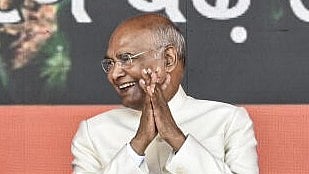
Former President Ram Nath Kovind during 'Rashtriya Swayamsevak Sangh Vijayadashami Utsav 2025', in Nagpur, Maharashtra.
Credit" PTI photo
Mumbai: As the Rashtriya Swyamsevak Sangh (RSS) celebrated its centenary, former President Ram Nath Kovind, who was the chief guest at the RSS Vijayadashami celebrations said that Mahatma Gandhi and Dr Babasaheb Ambedka were impressed with the work of RSS.
Kovind made a special mention of this in his address in presence of RSS chief Dr Mohan Bhagwat in Nagpur, the geographical centre of India.
According to him, Mahatma Gandhi was also highly impressed by the practice of harmony, equality and complete absence of caste-based discrimination in the working of the Sangh.
"A detailed description of this is available in the Collected Works of Mahatma Gandhi. Gandhiji addressed the RSS rally held in Delhi on 16 September 1947. In that address, Gandhiji mentioned about his visit to an RSS camp years ago during the lifetime of its founder Dr Keshav Baliram Hedgewar. During that visit, Gandhiji was very impressed by the discipline, simplicity and total absence of the practice of untouchability in the RSS camp,” said Kovind.
The former President said that in January 1940, Dr Ambedkar’s visit to RSS shakha in Karad town in Satara district of Maharashtra is a historical testimony of the inclusive vision and approach of the Sangh characterised by samarasata. “There, Babasahab had met the people of the shakha, expressed his sense of belonging, and offered his support to them,” he said.
Quoting for historical references, Kovind said: At that time, the Marathi-language newspaper Kesari was respected as a national newspaper. The Kesari of 9 January 1940 quoted an important statement by Babasaheb. He had said: “Even though there are some differences of opinion, I still look upon this Sangh with a sense of belonging.” This news was also published in Babasaheb’s own weekly paper ‘Janata’, reporting that after attending a function of the Karad Municipality, Babasaheb met members of the RSS and assured them of his support whenever needed.”
Saying that he was deeply inspired by Dr Ambedkar and Dr Hegdewar, Kovind said: “It is only because of the principles of social justice enshrined in DrAmbedkar’s Constitution that a person like me, from an ordinary economic and social background, could reach the highest constitutional office in the country. Dr Hedgewar's profound thoughts helped me have a clear understanding of the common man, the society and the nation. The ideals of national unity and social harmony formulated by these two great personalities have inspired my spirit of public service.”
Kovind said that despite three bans the RSS has emerged stronger. “In its 50th year, following the declaration of Emergency, the Sangh was banned in June 1975. “The strong resistance against Emergency launched
by RSS through an underground movement became a subject of international discussion. Even leaders and parties with differing ideologies praised the Sangh. They surmised that there must have been some high ideal that infused the Swayamsewaks with the spirit of sacrifice and indomitable courage for their heroic deeds. The organization faced bans in 1948, 1975, and 1992. After every ban, the Sangh grew bigger and emerged stronger amidst serious challenges,” the former President said.
‘Many institutions washed away’
Kovind said that many institutions, ideologies, personalities and nations that dominated the world stage have been washed away by the currents of history in the last hundred years. “Some of them have been totally forgotten. But the Sangh has grown greatly, not only in size but in strength and vibrancy too. This growth comes from the nourishment it systematically draws from the elixir of patriotism and the Indian ideals,” he said.
Bhim Smriti
Kovind also referred to Dalit Sangam Rally held in the premises of the Red Fort in 2001, when he was the President of Anusuchit Jati Morcha and former Prime Minister Atal Bihari Vajpayee was the chief guest. “Addressing that rally, Atalji had declared that “Our government has been formed for the welfare of Dalits, backward and the poor..... Our government will work not on the basis of Manusmriti but on the basis of Bhim Smriti. Bhim Smriti means the Constitution of India.” Atal ji also said, “we are Bhimvadi, which means Ambedkarvadi.” His address played a historic role in countering the disinformation campaign which was carried out with a view to turning this section of the society against the ideology of the Sangh and Atalji.”